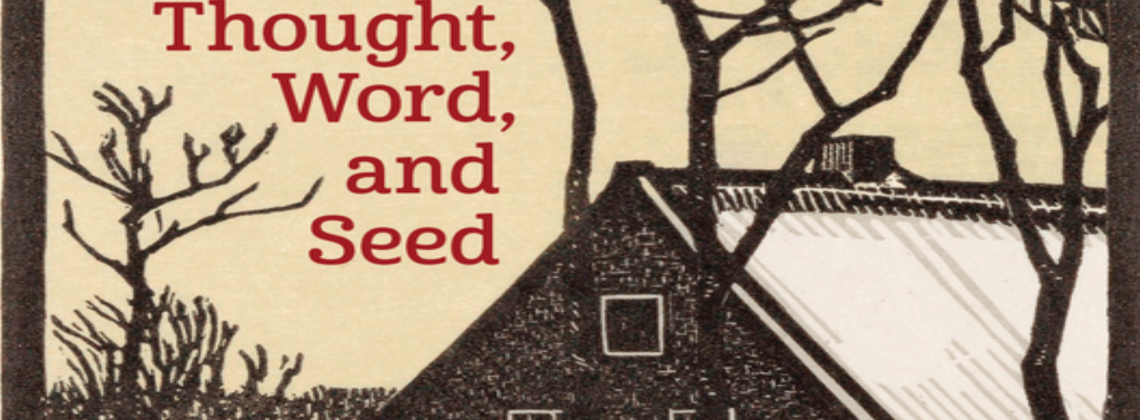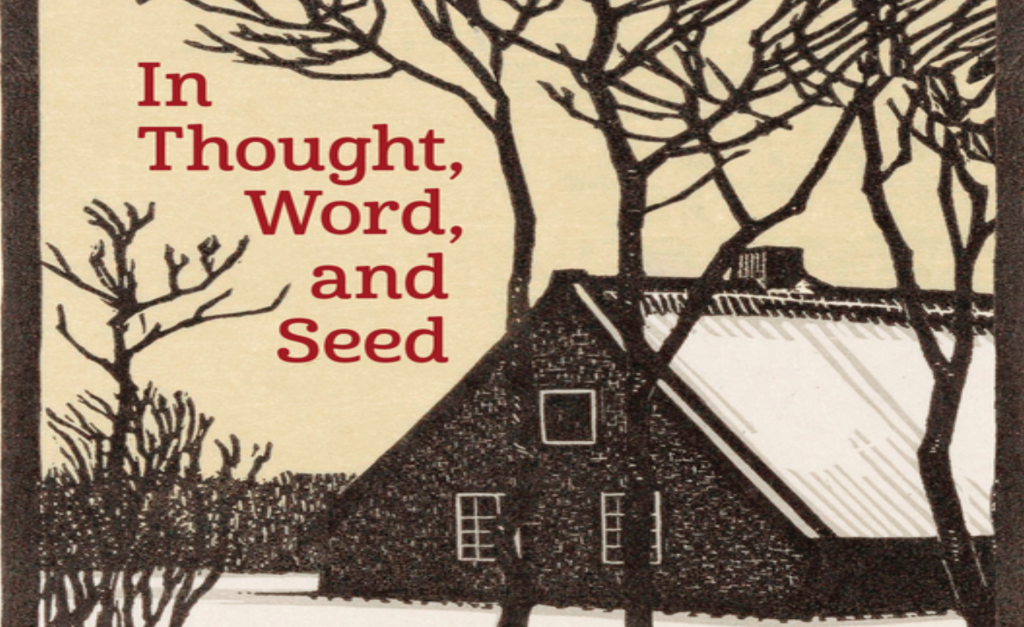

Amid fracture and pain, Tiffany Eberle Kriner finds hope on a farm
In Thought, Word, and Seed: Reckonings from a Midwest Farm by Tiffany Eberle Kriner. Eerdmans, 2023. 215 pp., $19.99
I may lose all credibility as a writing professor with a Ph.D. in English, but I need to open this review with an admission: I’ve long considered Henry David Thoreau insufferable. His Walden is an (unintended) paean to his privilege as a white man with the time and resources to sit in the woods and pontificate. Sure, he was a brilliant nature writer and thinker, and Walden has enough compelling lines to appease the meme-generating gods. But his world had little place for anyone unlike him, including the women he barely mentions in his masterpiece—and then only with contempt.
Thoreau came to mind repeatedly while I was reading Tiffany Eberle Kriner’s new book, In Thought, Word, and Seed: Reckonings from a Midwest Farm, as Kriner’s retreat to the woods echoes Thoreau’s relocation to Walden Pond. Of course, Kriner’s decision to homestead on a farm outside of Chicago with her husband and children differs from Thoreau’s solitary escape. Still, she explores her world with a keen understanding of place and of literature in ways similar to Thoreau’s own well-studied observations. Kriner writes beautifully about our complicated relationship to nature and each other, limning themes similar to those explored by Thoreau.
Despite these similarities—and my own long-standing grudge against Thoreau notwithstanding—I found In Thought, Word, and Seed a remarkable essay collection, and one sorely needed in a world beset by fragmentation, conflict, and despair. Kriner, an associate professor of English at Wheaton College, uses her considerable knowledge of literature and her nascent (but ever-growing) knowledge of farming to contemplate the mysteries of our universe, and also the holiness—the “hallowed be”—of creation and our place in it.
The collection of five essays opens with “Field,” which narrates the initial encounter that Kriner and her husband had with the sixty-acre patch of land they purchased in northern Illinois. They name their farm “Root and Sky,” a metaphor of grand ambition, and begin imagining their future on acreage that includes two homes not only in disrepair but filled with a hoard that conveys to Kriner the previous residents’ “unfathomable suffering.” There are also fifteen acres of farmable fields, some space for garden plots, and a whole lot of forest, in places choked with brambles.
“Field” sets the table for the essays that follow and the challenges Kriner’s family will face. But the opening essay also conveys a sense of hopefulness about what their new agrarian life might look like. Kriner sees possibility on the land, an opportunity to cultivate her husband’s dream of farming sustainably. Their hope extends far beyond growing healthy crops. “I thought we could build welcoming, diverse communities of neighbors, farmers, and artists,” Kriner writes. “I even though we might someday support research into better sustainable farming methods in a changing climate.” The verb tense here gives away the game, though her idealistic outlook and ambition to forge a more just, equitable, healthy world is something to which most of us aspire, in one way or another.
The next essay is framed as a series of letters to James Baldwin, written during the summer of 2020, when George Floyd became a household name. Kriner addresses Baldwin from her farm’s “Hidden Five,” a field inaccessible by car, where she tends sheep while the world seems to burn. The essay examines that summer’s tensions well, describing not only the racial reckoning following Floyd’s murder but also the pandemic, the calculations we all made (and continue to make) about whether we could travel or take the risk of visiting family. Kriner’s husband ends up ill, ravaged by Covid, and she must tend the farm alone while he struggles to recover. The words of Baldwin, Whitman, and that summer’s protest signs wind through her reflection, which thrums again with hope that light will prevail, as the “stem of Queen Anne’s Lace” offers a sign of life in a field’s brown grass.
Subsequent essays build on this tension between the fragmented and suffering world, reflected in the farm’s cycle of chaos and entropy, and the promise of rebirth. In “Clearing,” for example, Kriner narrates a day spent tending a wounded horned owl. By tending, she means sitting in vigil nearby, trying to decide what to do; using her phone to post on social media, seeking advice and finding it in a rescue center; and carefully watching the hawk circling above, fearful that the owl might become prey. And praying, too. Kriner’s invocation to pay attention is written in the scripture and poetry that she quotes throughout—a reminder to truly see the natural beauty we can often miss now that our heads are too often turned toward technology and the manufactured worlds created there.
It’s this call to pay attention that resonates most clearly In Thought, Word, and Seed—to pay attention wherever we find ourselves rooted, attending not only to the land around us but also to the language used by poets and prophets, who remind us to see beauty “not just in spite of but because of the worst.” Kriner’s final essay, “Wattle,” is an affirmation that the earth is filled with God’s glory, and that even the seemingly prosaic reflects God’s capaciousness: sheep breaking free of their enclosure, and on Father’s Day no less, a hallowed moment that calls for thanksgiving.
The scene is humorous and holy. It reflects one reason I enjoyed Kriner’s book far more than Walden. Kriner doesn’t take herself too seriously and recognizes the privilege of chasing sheep when so much else is wrong in the world. This is probably why I was inordinately pleased when Kriner mentioned Thoreau directly—and admitted that her Wheaton students also hated Walden (“as charitably as they could”). In an eight-week course dedicated to a close reading of Walden, Kriner found the course “rich and intimate, conversations focusing so closely on the text that we’d even consider its punctuation.” But then one student said “think of the hours he just was sitting there, looking at the lake. I mean, can you really justify that time?”
“It’s not an unfair question,” Kriner admits.
Kriner’s work is an extraordinary exploration of how our time is justified when suffering and injustice persists. It is also an affirmation that the holy exists everywhere—in our thoughts, in our words, and in the seeds that we plant with the wild hope that beauty will bloom.
Melanie Springer Mock is Professor of English at George Fox University. Her books include Finding Our Way Forward: When the Children We Love Become Adults (2023), Worthy: Finding Yourself in a World Expecting Someone Else (2018), and If Eve Only Knew: Freeing Yourself from Biblical Womanhood to Become Who God Expected You to Be (2015). Her essays have appeared in Christian Feminism Today, Literary Mama, The Chronicle of Higher Education, Brain, Child, and Runner’s World, among other places. Much of her work focuses on her experiences parenting, feminism within Christian context, and social justice.
It’s true that our forbears had their blind-spots and prejudices, ones that we sometimes–often by being afforded the leisure to reflect on their examples–have gotten over. And even at their best they don’t know our lingo, and thus commit numerous infelicities of expression. Mr. Thoreau fails at numerous points.
He was, indeed, a white man, and he didn’t open up his cabin on Walden Pond to people “unlike him.” He didn’t open it up much to people who were like him–other white men–either. He went to the woods for two years to be alone and to see what he could learn from that experience. Perhaps that’s a bad thing. Or perhaps it’s not so different from academics taking sabbaticals and living similarly. He could have gone down to Boston and found a couple dozen orphans to share the experience with–I don’t know if they would have appreciated that–but contemporary academics could do something like that on their sabbaticals, I suppose.
I suppose the latter have the virtue, at least, to feel a little guilty about it–at least guilty enough to confess their “privilege” before the right audiences. Whether such confessions do any more for those getting the business end of “suffering and injustice” in our age than Thoreau’s unwelcome mat did back then is a question we could investigate.
It’s an interesting connection that both Professor Kriner and Mr. Thoreau lived at moments of keen awareness about racial injustice, each moved to the country, and each wrote about it. Mr. Thoreau wrote “Civil Disobedience,” which influenced Gandhi and Martin Luther King, he contributed to the underground railroad, and he spoke out in defense of John Brown in ways the South found so alarming it became convinced the Republican Party was a mortal threat (thus leading to secession, war, and eventually emancipation). Professor Kriner, during the summer of George Floyd, apparently chose to write letters to James Baldwin–who died in 1987. (Not that there’s anything wrong with that.)
Professor Kriner (and the reviewer) have a jaundiced take on all the hours Mr. Thoreau spent looking at Walden Pond. It is insinuated that this was a bad–ie, self-indulgent–use of his time. For her part, Professor Kriner devotes hours to watching an injured owl and praying for its well-being. In her case it’s understood that obeyng the mandate to “pay attention” to the quiet things of the natural world does involve investing some time.
Still, the difference is undeniable: Thoreau was blind to his privilege (and is thus judged “insufferable”). Professor Kriner is aware of hers. In the world of the contemporary writerly bourgeoisie, that’s important.